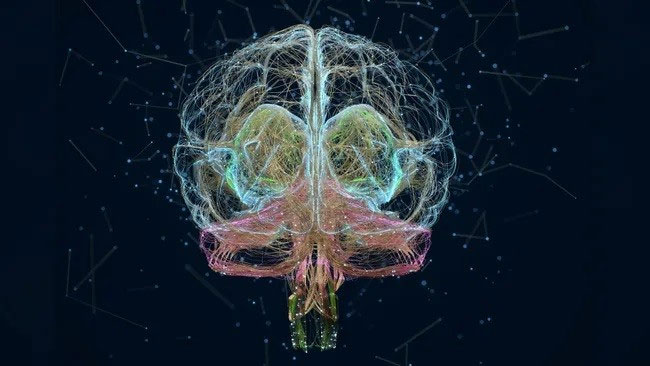Billionaire Elon Musk's 'computer-brain' warning is vulnerable to attack and manipulation by third parties
Billionaire Elon Musk's Neuralink project to put a computer into the human brain has the potential to change the lives of some people, but it also causes many ethical issues.
Putting a computer into the human brain seems like a science fiction story, but it is about to become a reality through the project of billionaire Elon Musk's Neuralink company. Academic and commercial groups are testing "brain-computer" devices to help people with disabilities function more independently, but the project is at the center of debates about safety, ethics and safety. and neuroscience.
In January 2024, billionaire Elon Musk announced that they had implanted their first chip into the human brain.

Neuralink has just launched its first human trial but is facing ethical controversy. (Photo: Andriy Onufriyenko/Moment).
How does the human brain chip work?
Neuralink's coin-sized device, called N1 , is designed to allow patients to perform actions simply by focusing on them, without needing to move their body.
Subjects in the company's study underwent surgery to place the device in the part of the brain that controls movement. The chip records and processes the electrical activity of the human brain, then transmits this data to an external device such as a phone or computer.
The external device "decodes" the patient's brain activity, learning to associate certain patterns with the patient's goals: moving a computer cursor onto the screen, for example. Over time, the software was able to recognize the persistent pattern of neural activation that occurred while the participant was imagining the task and then performing it.
Neuralink's current trial focuses on helping people with paralysis control their computers or smartphones. Brain-computer devices, commonly known as BCIs, can also be used to control devices such as wheelchairs.
Non-invasive devices placed outside the human head have been used in clinical trials for a long time, but they have not received approval from the US Food and Drug Administration (FDA). ) for commercial development.
There are other brain-computer devices, similar to Neuralink's, that are fully implantable and wireless. However, the N1 implant combines more technology in a single device. It can target individual neurons, record from thousands of locations in the brain, and recharge its small battery wirelessly. These are important advances that can produce better results.
Why is Neuralink criticized?
Neuralink received FDA approval for human trials in May 2023. Musk announced the company's first human trials on social media platform X in January 2024.
However, little is known about the implant, other than a brochure aimed at recruiting test subjects.
When scientific research is sponsored by government agencies or charitable groups, its purpose is to promote the public good. Meanwhile, Neuralink embodies a private equity model that is becoming more popular in science, but they also strive to maximize profits, which can conflict with the best interests of the patient. core.
What ethical issues does Neuralink's trial raise?
When 'brain-computer' devices are used to help disabled patients function more independently, such as helping them communicate or move, this can profoundly improve quality of life. their. In particular, it helps people restore their sense of agency or autonomy – one of the key tenets of medical ethics.
However, well-intentioned medical interventions can have unintended consequences. With BCI, scientists and ethicists are especially concerned about the potential for identity theft, password hacking, and blackmail. Given how devices access a user's thoughts, there is also the possibility that autonomy could be manipulated by a third party.
In addition to flaws and privacy risks, scientists also worry about the potential adverse effects of an implanted device like Neuralink, since the device's components are not easily replaced after implant.
Currently, Neuralink's trials focus on paralyzed patients. However, Eon Musk said his ultimate goal is to help humanity - including healthy people - "keep up" with artificial intelligence.
- Elon Musk sponsors a shocking project that unites human brain with AI
- Elon Musk will implant a chip in the human brain next year
- Things Elon Musk faces when it comes to uploading human brains on the internet
- Elon Musk claims to link the human brain to the computer for four years
- The human brain-to-computer shock project has received more than $ 27 million
- Elon Musk invested hundreds of millions of dollars to 'chip' the chip into the human brain
- Heart attack warning device
- 'Psychological manipulation' helps you convince others
- BCI (Brain Computer Interface): the future of controlling machines by thought
- Elon Musk announced: The brain-computer-linked product will come out in the next few months.
- How to prevent and escape when the dog attacks
- Elon Musk's 'brain hack' riddle: CNBC is spread all over Manhattan but only one person answered correctly!
 The US company is about to build a supersonic passenger plane of 6,000km / h
The US company is about to build a supersonic passenger plane of 6,000km / h Japan develops avatar robot as in fiction film
Japan develops avatar robot as in fiction film Australia tested the world's first mango picking robot
Australia tested the world's first mango picking robot America develops technology to separate water from animal waste
America develops technology to separate water from animal waste